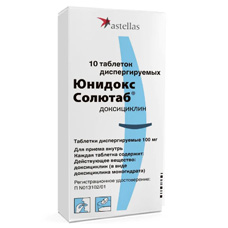
Doxycycline Express
Doxycycline is a semi-synthetic antibiotic of the tetracycline group with a wide spectrum of action, which has a bacteriostatic effect by suppressing protein synthesis of pathogens.Doxycycline Express is available in the form of soluble tablets.

Pharmachologic effect:
Doxycycline is a semi-synthetic broad-spectrum antibiotic of the tetracycline group. It has a bacteriostatic effect by inhibiting protein synthesis of pathogens.
Doxycycline is active against aerobic gram-positive bacteria: Staphylococcus spp., Streptococcus spp., Bacillus anthracis, Listeria monocytogenes; anaerobic bacteria: Clostridium spp.
Doxycycline is also active against aerobic gram-negative bacteria: Neisseria gonorrhoeae, Escherichia coli, Shigella spp., Salmonella spp., Enterobacter spp., Klebsiella spp., Bordetella pertussis, as well as against Rickettsia spp., Treponema spp., Mycoplasma spp. and Chlamydia spp.
Pseudomonas aeruginosa, Proteus spp., Serratia spp., most strains of Bacteroides fragilis are resistant to doxycycline.
Pharmacokinetics:
After oral administration, doxycycline is rapidly and almost completely absorbed from the gastrointestinal tract. Food intake has little effect on the absorption of doxycycline. Widely distributed in tissues and body fluids. Plasma protein binding is 80-95%. T1/2 is 12-22 hours. It is excreted in the urine unchanged (40%), but the main part of the dose is excreted unchanged in the feces due to bile secretion.
Indications:
Infectious and inflammatory diseases caused by microorganisms sensitive to doxycycline, incl. infections of the respiratory and ENT organs; gastrointestinal infections; purulent infections of the skin and soft tissues (including acne); infections of the genitourinary system (including gonorrhea, primary and secondary syphilis); typhus, brucellosis, rickettsiosis, osteomyelitis, trachoma, chlamydia.
Contraindications:
Pregnancy, children under 8 years of age (the possibility of the formation of insoluble complexes with calcium in the bone skeleton, enamel and dentin of the teeth), hypersensitivity to tetracyclines, porphyria, severe liver failure, leukopenia, lactation, myasthenia gravis (for intravenous administration).
Pregnancy and breast-feeding:
Doxycycline is contraindicated for use during pregnancy and lactation. Doxycycline crosses the placental barrier. It can cause long-term discoloration of the teeth, enamel hypoplasia, suppression of the growth of the bones of the fetal skeleton, and the development of fatty liver.
If necessary use during lactation, breastfeeding should be stopped.
Side effects:
Digestive system: nausea, vomiting, anorexia, abdominal pain, diarrhea, constipation, dysphagia, glossitis, esophagitis, transient increase in blood levels of hepatic transaminases, alkaline phosphatase, bilirubin.
Hemopoietic system: neutropenia, thrombocytopenia, hemolytic anemia.
Allergic reactions: skin rash, itching, eosinophilia; rarely - Quincke's edema, photosensitivity.
Others: an increase in residual nitrogen, candidiasis, intestinal dysbacteriosis, discoloration of teeth in children.
Interaction:
Preparations containing metal ions (antacids, preparations containing iron, magnesium, calcium) form inactive chelates with doxycycline, and therefore their simultaneous administration should be avoided.
Simultaneous use of barbiturates, carbamazepine, phenytoin decreases the concentration of doxycycline in the blood plasma due to the induction of microsomal liver enzymes, which may be the reason for the decrease in its antibacterial action.
It is necessary to avoid combination with penicillins, cephalosporins, which have a bactericidal effect and are antagonists of bacteriostatic antibiotics (including doxycycline).
The absorption of doxycycline is reduced by cholestyramine and colestipol (observe an interval between doses of at least 3 hours).
Due to the suppression of the intestinal microflora, doxycycline reduces the prothrombin index, which requires dose adjustment of indirect anticoagulants.
Taking doxycycline reduces the reliability of contraception and increases the incidence of breakthrough bleeding while taking estrogen-containing oral contraceptives.
The simultaneous use of retinol increases intracranial pressure.
Dosing and Administration:
Adults take orally 200 mg / day on the first day of treatment, on subsequent days - 100-200 mg / day. Multiplicity of reception - 1-2 times / day. For children over 8 years of age and weighing more than 50 kg, the daily dose is 4 mg / kg on the first day of treatment. In the following days - 2-4 mg / kg / day, depending on the severity of the clinical course of the disease. Multiplicity of reception - 1-2 times / day.
Maximum dose for adultsшы 300 mg / day or 600 mg / day (depending on the etiology of the pathogen);
Special instructions:
Doxycycline should be used with caution in violations of liver function. In case of impaired renal function, dose adjustment is not required.
To prevent local irritating effects (esophagitis, gastritis, ulceration of the gastrointestinal tract), it is recommended to take it during the daytime with plenty of liquid, food or milk. In connection with the possible development of photosensitivity, it is necessary to limit insolation during treatment and for 4-5 days after it.
Doxycycline is not used in children under 8 years of age, because. tetracyclines (including doxycycline) cause long-term discoloration of the teeth, enamel hypoplasia and slowing down the longitudinal growth of the bones of the skeleton in this category of patients.
Doxycycline Express
in Cyrillic : Доксициклин Экспресс
SUBSTANCE
Doxycycline
DOSAGE FORM
dispersible tablets
MANUFACTURER
In Stock
available pack options :
| 100mg x 10 dispersible tablets | $14.10 | |
| 100mg x 20 dispersible tablets | $25.50 |


